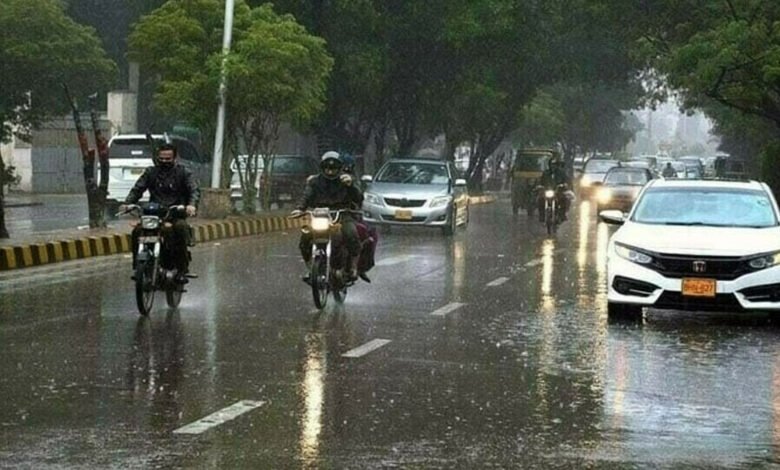NDMA Issues Nationwide Weather Alert: Heavy Rains, Flood Risks Across Pakistan
The National Disaster Management Authority (NDMA) has issued a comprehensive nationwide weather alert, urging citizens across Pakistan to prepare for severe weather conditions over the coming two days. Forecasts from the Pakistan Meteorological Department warn of heavy rains, intense thunderstorms, and the potential for a number of dangerous natural events, including urban flooding, flash floods, and Glacial Lake Outburst Floods (GLOFs).
Regions on High Alert
According to NDMA, the most vulnerable areas include:
-
Khyber Pakhtunkhwa
-
Gilgit-Baltistan
-
Punjab
-
Sindh
-
Balochistan
In these regions, local authorities have been advised to activate emergency response mechanisms and prepare for any weather-related disasters. Citizens in these areas are strongly advised to stay vigilant, remain updated via official channels, and avoid unnecessary travel, especially in flood-prone or mountainous regions.
Urban Flooding and GLOF Warnings
Urban flooding is expected in densely populated cities where drainage systems may not be able to handle sudden downpours. In the northern regions, especially in Gilgit-Baltistan, authorities are particularly concerned about Glacial Lake Outburst Floods (GLOFs) — sudden floods caused by melting glaciers bursting through natural dams. These events can be extremely destructive and occur with very little warning.
Flash Flood Risk in Low-Lying Areas
The NDMA has issued special warnings for people living near rivers, canals, streams, and hilly terrain. In low-lying districts, even moderate rainfall can quickly lead to flash floods. Farmers and rural communities are advised to secure livestock and protect essential belongings.
Government Action and Public Safety
Prime Minister Shehbaz Sharif has directed relevant authorities to activate emergency response plans and ensure public safety measures are in place. One significant measure includes the use of cellphone alert systems to provide real-time warnings to the public in affected areas. This proactive step aims to prevent loss of life and ensure timely evacuations, if needed.
Emergency services, rescue teams, and local governments are on high alert. Medical aid, shelter arrangements, and food supplies are being prepared in case evacuation or relief operations are required.
NDMA’s Advice to the Public
-
Stay indoors during heavy rainfall and storms.
-
Avoid rivers, streams, and mountain roads where flash floods or landslides are possible.
-
Secure your homes, especially rooftops and basements.
-
Do not attempt to drive through flooded roads or underpasses.
-
Listen to official updates from the NDMA, Met Office, and local authorities.
-
Keep emergency kits ready, including drinking water, first aid, flashlights, batteries, and mobile power banks.
Expected Monsoon Severity
Experts warn that this monsoon season is likely to be more intense than usual, raising concerns about the country’s disaster readiness. NDMA and the Meteorological Department are working together to monitor evolving weather patterns and issue timely alerts.
Climate experts note that Pakistan, being on the frontlines of climate change, is increasingly prone to extreme weather events like heatwaves, floods, and glacier-related disasters. The melting of northern glaciers, accelerated by rising temperatures, has increased the number of glacial lakes, putting nearby communities at high risk.
Conclusion: A Call for National Preparedness
This nationwide weather alert is a reminder for all Pakistanis to stay alert, informed, and prepared. Even a few moments of caution can make a life-saving difference.
Government officials, aid organizations, and the public must work together to respond swiftly to any emergency. As monsoon rains approach, preparedness, timely action, and community cooperation will be key to minimizing damage and saving lives.
___________________________________________________________________________________
US Senate advances Trump’s megabill branded ‘insane’ by Elon Musk
Read This Article
___________________________________________________________________________________
NDMA Issues Nationwide Weather Alert: Heavy Rains, Flood Risks Across Pakistan
The National Disaster Management Authority (NDMA) has issued a comprehensive nationwide weather alert, urging citizens across Pakistan to prepare for severe weather conditions over the coming two days. Forecasts from the Pakistan Meteorological Department warn of heavy rains, intense thunderstorms, and the potential for a number of dangerous natural events, including urban flooding, flash floods, and Glacial Lake Outburst Floods (GLOFs).
Regions on High Alert
According to NDMA, the most vulnerable areas include:
-
Khyber Pakhtunkhwa
-
Gilgit-Baltistan
-
Punjab
-
Sindh
-
Balochistan
In these regions, local authorities have been advised to activate emergency response mechanisms and prepare for any weather-related disasters. Citizens in these areas are strongly advised to stay vigilant, remain updated via official channels, and avoid unnecessary travel, especially in flood-prone or mountainous regions.
Urban Flooding and GLOF Warnings
Urban flooding is expected in densely populated cities where drainage systems may not be able to handle sudden downpours. In the northern regions, especially in Gilgit-Baltistan, authorities are particularly concerned about Glacial Lake Outburst Floods (GLOFs) — sudden floods caused by melting glaciers bursting through natural dams. These events can be extremely destructive and occur with very little warning.
Flash Flood Risk in Low-Lying Areas
The NDMA has issued special warnings for people living near rivers, canals, streams, and hilly terrain. In low-lying districts, even moderate rainfall can quickly lead to flash floods. Farmers and rural communities are advised to secure livestock and protect essential belongings.
Government Action and Public Safety
Prime Minister Shehbaz Sharif has directed relevant authorities to activate emergency response plans and ensure public safety measures are in place. One significant measure includes the use of cellphone alert systems to provide real-time warnings to the public in affected areas. This proactive step aims to prevent loss of life and ensure timely evacuations, if needed.
Emergency services, rescue teams, and local governments are on high alert. Medical aid, shelter arrangements, and food supplies are being prepared in case evacuation or relief operations are required.
NDMA’s Advice to the Public
-
Stay indoors during heavy rainfall and storms.
-
Avoid rivers, streams, and mountain roads where flash floods or landslides are possible.
-
Secure your homes, especially rooftops and basements.
-
Do not attempt to drive through flooded roads or underpasses.
-
Listen to official updates from the NDMA, Met Office, and local authorities.
-
Keep emergency kits ready, including drinking water, first aid, flashlights, batteries, and mobile power banks.
Expected Monsoon Severity
Experts warn that this monsoon season is likely to be more intense than usual, raising concerns about the country’s disaster readiness. NDMA and the Meteorological Department are working together to monitor evolving weather patterns and issue timely alerts.
Climate experts note that Pakistan, being on the frontlines of climate change, is increasingly prone to extreme weather events like heatwaves, floods, and glacier-related disasters. The melting of northern glaciers, accelerated by rising temperatures, has increased the number of glacial lakes, putting nearby communities at high risk.
Conclusion: A Call for National Preparedness
This nationwide weather alert is a reminder for all Pakistanis to stay alert, informed, and prepared. Even a few moments of caution can make a life-saving difference.
Government officials, aid organizations, and the public must work together to respond swiftly to any emergency. As monsoon rains approach, preparedness, timely action, and community cooperation will be key to minimizing damage and saving lives.
NDMA Issues Nationwide Weather Alert: Heavy Rains, Flood Risks Across Pakistan
The National Disaster Management Authority (NDMA) has issued a comprehensive nationwide weather alert, urging citizens across Pakistan to prepare for severe weather conditions over the coming two days. Forecasts from the Pakistan Meteorological Department warn of heavy rains, intense thunderstorms, and the potential for a number of dangerous natural events, including urban flooding, flash floods, and Glacial Lake Outburst Floods (GLOFs).
Regions on High Alert
According to NDMA, the most vulnerable areas include:
-
Khyber Pakhtunkhwa
-
Gilgit-Baltistan
-
Punjab
-
Sindh
-
Balochistan
In these regions, local authorities have been advised to activate emergency response mechanisms and prepare for any weather-related disasters. Citizens in these areas are strongly advised to stay vigilant, remain updated via official channels, and avoid unnecessary travel, especially in flood-prone or mountainous regions Heavy Rain.
Urban Flooding and GLOF Warnings
Urban flooding is expected in densely populated cities where drainage systems may not be able to handle sudden downpours. In the northern regions, especially in Gilgit-Baltistan, authorities are particularly concerned about Glacial Lake Outburst Floods (GLOFs) — sudden floods caused by melting glaciers bursting through natural dams. These events can be extremely destructive and occur with very little warning Heavy Rain.
Flash Flood Risk in Low-Lying Areas
The NDMA has issued special warnings for people living near rivers, canals, streams, and hilly terrain. In low-lying districts, even moderate rainfall can quickly lead to flash floods. Farmers and rural communities are advised to secure livestock and protect essential belongings Heavy Rain.
Government Action and Public Safety
Prime Minister Shehbaz Sharif has directed relevant authorities to activate emergency response plans and ensure public safety measures are in place. One significant measure includes the use of cellphone alert systems to provide real-time warnings to the public in affected areas. This proactive step aims to prevent loss of life and ensure timely evacuations, if needed Heavy Rain.
Emergency services, rescue teams, and local governments are on high alert. Medical aid, shelter arrangements, and food supplies are being prepared in case evacuation or relief operations are required Heavy Rain.
NDMA’s Advice to the Public
-
Stay indoors during heavy rainfall and storms Heavy Rain.
-
Avoid rivers, streams, and mountain roads where flash floods or landslides are possible.
-
Secure your homes, especially rooftops and basements Heavy Rain.
-
Do not attempt to drive through flooded roads or underpasses Heavy Rain.
-
Listen to official updates from the NDMA, Met Office, and local authorities Heavy Rain.
-
Keep emergency kits ready, including drinking water, first aid, flashlights, batteries, and mobile power banks.
Expected Monsoon Severity
Experts warn that this monsoon season is likely to be more intense than usual, raising concerns about the country’s disaster readiness. NDMA and the Meteorological Department are working together to monitor evolving weather patterns and issue timely alerts Heavy Rain.
Climate experts note that Pakistan, being on the frontlines of climate change, is increasingly prone to extreme weather events like heatwaves, floods, and glacier-related disasters. The melting of northern glaciers, accelerated by rising temperatures, has increased the number of glacial lakes, putting nearby communities at high risk Heavy Rain.
Conclusion: A Call for National Preparedness
This nationwide weather alert is a reminder for all Pakistanis to stay alert, informed, and prepared. Even a few moments of caution can make a life-saving difference Heavy Rain.
Government officials, aid organizations, and the public must work together to respond swiftly to any emergency. As monsoon rains approach, preparedness, timely action, and community cooperation will be key to minimizing damage and saving lives Heavy Rain.
NDMA Issues Nationwide Weather Alert: Heavy Rains, Flood Risks Across Pakistan
The National Disaster Management Authority (NDMA) has issued a comprehensive nationwide weather alert, urging citizens across Pakistan to prepare for severe weather conditions over the coming two days. Forecasts from the Pakistan Meteorological Department warn of heavy rains, intense thunderstorms, and the potential for a number of dangerous natural events, including urban flooding, flash floods, and Glacial Lake Outburst Floods (GLOFs).
Regions on High Alert
According to NDMA, the most vulnerable areas include:
-
Khyber Pakhtunkhwa
-
Gilgit-Baltistan
-
Punjab
-
Sindh
-
Balochistan
In these regions, local authorities have been advised to activate emergency response mechanisms and prepare for any weather-related disasters. Citizens in these areas are strongly advised to stay vigilant, remain updated via official channels, and avoid unnecessary travel, especially in flood-prone or mountainous regions Heavy Rain.
Urban Flooding and GLOF Warnings
Urban flooding is expected in densely populated cities where drainage systems may not be able to handle sudden downpours. In the northern regions, especially in Gilgit-Baltistan, authorities are particularly concerned about Glacial Lake Outburst Floods (GLOFs) — sudden floods caused by melting glaciers bursting through natural dams. These events can be extremely destructive and occur with very little warning Heavy Rain.
Flash Flood Risk in Low-Lying Areas
The NDMA has issued special warnings for people living near rivers, canals, streams, and hilly terrain. In low-lying districts, even moderate rainfall can quickly lead to flash floods. Farmers and rural communities are advised to secure livestock and protect essential belongings Heavy Rain.
Government Action and Public Safety
Prime Minister Shehbaz Sharif has directed relevant authorities to activate emergency response plans and ensure public safety measures are in place. One significant measure includes the use of cellphone alert systems to provide real-time warnings to the public in affected areas. This proactive step aims to prevent loss of life and ensure timely evacuations, if needed Heavy Rain.
Emergency services, rescue teams, and local governments are on high alert. Medical aid, shelter arrangements, and food supplies are being prepared in case evacuation or relief operations are required Heavy Rain.
NDMA’s Advice to the Public
-
Stay indoors during heavy rainfall and storms.
-
Avoid rivers, streams, and mountain roads where flash floods or landslides are possible.
-
Secure your homes, especially rooftops and basements Heavy Rain.
-
Do not attempt to drive through flooded roads or underpasses Heavy Rain.
-
Listen to official updates from the NDMA, Met Office, and local authorities Heavy Rain.
-
Keep emergency kits ready, including drinking water, first aid, flashlights, batteries, and mobile power banks.
Expected Monsoon Severity
Experts warn that this monsoon season is likely to be more intense than usual, raising concerns about the country’s disaster readiness. NDMA and the Meteorological Department are working together to monitor evolving weather patterns and issue timely alertsv Heavy Rain.
Climate experts note that Pakistan, being on the frontlines of climate change, is increasingly prone to extreme weather events like heatwaves, floods, and glacier-related disasters. The melting of northern glaciers, accelerated by rising temperatures, has increased the number of glacial lakes, putting nearby communities at high risk Heavy Rain.
Conclusion: A Call for National Preparedness
This nationwide weather alert is a reminder for all Pakistanis to stay alert, informed, and prepared. Even a few moments of caution can make a life-saving difference Heavy Rain.
Government officials, aid organizations, and the public must work together to respond swiftly to any emergency. As monsoon rains approach, preparedness, timely action, and community cooperation will be key to minimizing damage and saving lives Heavy Rain.
NDMA Issues Nationwide Weather Alert: Heavy Rains, Flood Risks Across Pakistan
The National Disaster Management Authority (NDMA) has issued a comprehensive nationwide weather alert, urging citizens across Pakistan to prepare for severe weather conditions over the coming two days. Forecasts from the Pakistan Meteorological Department warn of heavy rains, intense thunderstorms, and the potential for a number of dangerous natural events, including urban flooding, flash floods, and Glacial Lake Outburst Floods (GLOFs).
Regions on High Alert
According to NDMA, the most vulnerable areas include:
-
Khyber Pakhtunkhwa
-
Gilgit-Baltistan
-
Punjab
-
Sindh
-
Balochistan
In these regions, local authorities have been advised to activate emergency response mechanisms and prepare for any weather-related disasters. Citizens in these areas are strongly advised to stay vigilant, remain updated via official channels, and avoid unnecessary travel, especially in flood-prone or mountainous regions Heavy Rain.
Urban Flooding and GLOF Warnings
Urban flooding is expected in densely populated cities where drainage systems may not be able to handle sudden downpours. In the northern regions, especially in Gilgit-Baltistan, authorities are particularly concerned about Glacial Lake Outburst Floods (GLOFs) — sudden floods caused by melting glaciers bursting through natural dams. These events can be extremely destructive and occur with very little warning Heavy Rain.
Flash Flood Risk in Low-Lying Areas
The NDMA has issued special warnings for people living near rivers, canals, streams, and hilly terrain. In low-lying districts, even moderate rainfall can quickly lead to flash floods. Farmers and rural communities are advised to secure livestock and protect essential belongings Heavy Rain.
Government Action and Public Safety
Prime Minister Shehbaz Sharif has directed relevant authorities to activate emergency response plans and ensure public safety measures are in place. One significant measure includes the use of cellphone alert systems to provide real-time warnings to the public in affected areas. This proactive step aims to prevent loss of life and ensure timely evacuations, if needed Heavy Rain.
Emergency services, rescue teams, and local governments are on high alert. Medical aid, shelter arrangements, and food supplies are being prepared in case evacuation or relief operations are required Heavy Rain.
NDMA’s Advice to the Public
-
Stay indoors during heavy rainfall and storms Heavy Rain.
-
Avoid rivers, streams, and mountain roads where flash floods or landslides are possible Heavy Rain.
-
Secure your homes, especially rooftops and basements Heavy Rain.
-
Do not attempt to drive through flooded roads or underpasses Heavy Rain.
-
Listen to official updates from the NDMA, Met Office, and local authorities Heavy Rain.
-
Keep emergency kits ready, including drinking water, first aid, flashlights, batteries, and mobile power banks.
Expected Monsoon Severity
Experts warn that this monsoon season is likely to be more intense than usual, raising concerns about the country’s disaster readiness. NDMA and the Meteorological Department are working together to monitor evolving weather patterns and issue timely alerts Heavy Rain.
Climate experts note that Pakistan, being on the frontlines of climate change, is increasingly prone to extreme weather events like heatwaves, floods, and glacier-related disasters. The melting of northern glaciers, accelerated by rising temperatures, has increased the number of glacial lakes, putting nearby communities at high risk Pakistan Heavy Rain.
Conclusion: A Call for National Preparedness
This nationwide weather alert is a reminder for all Pakistanis to stay alert, informed, and prepared. Even a few moments of caution can make a life-saving difference.




